Blood On My Hands: My Failure & Redemption in "Mass Effect" - a podcast by J.C. Hutchins
from 2021-01-31T22:10:42.023393
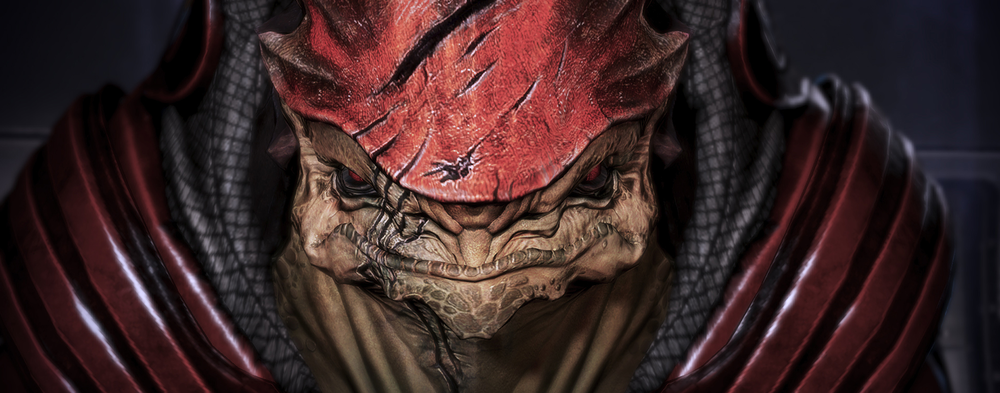
Warning: This post is packed with plot spoilers for the Mass Effect trilogy.
I completed the Mass Effect video game trilogy more than a week ago, and yet a hearty chunk of my mind stubbornly remains back there, on those many worlds, considering the many choices I made. The mistakes I made.
Looking back now, I realize when I became smitten by the series. It was a scene in the first game. It took less than two minutes to unfold, and ended with a thunderclap. Though I wouldn't realize it until much later, this moment made a profound impact on how I played the rest of the game, and its two sequels. Get your head around that: Dozens of hours of play, all affected by 90 seconds.
Sometimes, that's all it takes. Kinda like real life.
A LEGACY OF PAIN
I've already shared a bit about how I played my Commander Shepard during the series. The Greatest Hits recap: My Shepard was a surly soldier who didn't truck with bullshit. She was an orphan born on Earth, a former criminal who did absolutely everything it took to achieve her mission objectives. She didn't like aliens much, mostly because they didn't like her. She trusted no one. She was merciless.
As the scope of Mass Effect's story widened, my Shepard dropped the attitude about aliens. This was mostly brought on by her collaborations with several aliens during the story, all of whom were brilliantly realized characters, and righteous badasses.
There was another influencing factor, however. Ashley Williams, a member of Shepard's crew, was xenophobic. Her deep mistrust hailed from family history and military experience. Ashley's reasons may have been legit, but I soon realized it didn't matter. See, you start to wonder about your own biases when bigots evangelize their closed-minded hate. Ashley's behavior soon changed Shepard's, and for the better.
My favorite alien crew member was Wrex, the only character in Mass Effect 1 whose surly sass could keep pace with my Shepard's. The krogan bounty hunter loved to fight, but he wasn't a stupid brute. He was heartbroken about how his species remained on the brink of extinction due to the "genophage," a biological weapon deployed 1,000 years ago by two colluding alien species. Their goal had been to control the krogan population, and it had worked. The krogan didn't have a say in the matter.
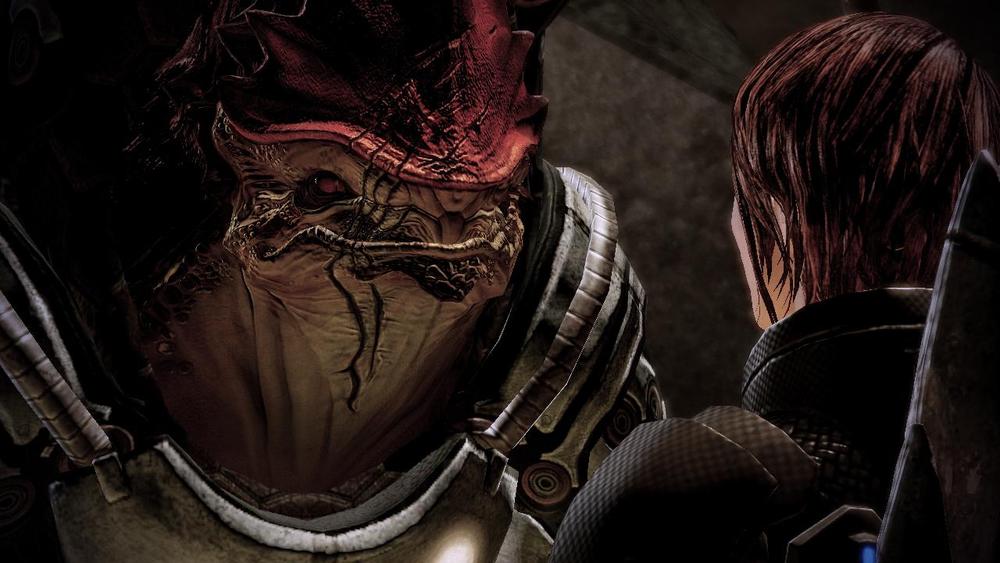
Wrex and Shepard
Truthfully, the krogan hadn't fully controlled their fate for some time. The species was technologically "uplifted" by other aliens 1,000 years before the genophage to be used as a willing army against the aggressive rachni, a conquering insect-like race.
This technological empowerment created big problems. After the Rachni Wars, the krogan
aggressively expanded their borders. Left unchecked, they — and the war
they inevitably brought with them — might have dominated the galaxy. The genophage "solution" was released, and everything changed.
Wrex was right to be heartbroken about the genophage. For 1,000 years, only one in every 1,000 krogan survived birth. Fatalistic thinking had plagued the species ever since; its males marched off to war against opposing krogan clans, or they worked as mercs. Most came home in body bags, filled with bullets. The species was dying.
Wrex wanted more for his people. He hoped the krogan might one day be cured. I did too. I reckoned a thousand years of pain, and god knew how many billions of dead babies, was penance enough. I didn't believe anyone had the right to make such a devastating and species-changing decision as the genophage.
A FRIEND LOST
Which brings us to the planet Virmire, where 90 seconds of dialogue changed how I played the Mass Effect trilogy.
Folks who've played Mass Effect 1 probably recall that Saren, a rogue Spectre brainwashed by the villainous Reapers, was up to no good at Virmire. There, he'd built a facility that was successfully breeding a krogan army. Saren had concocted a cure for the genophage. In order to thwart Saren's galaxy-threatening plan, it became clear that the base — and in the process, the genophage cure — would be destroyed.
For 90 seconds, my Shepard and Wrex argued about this. Wrex demanded the squad retrieve the cure. I tried to explain that Shepard was sympathetic, but it couldn't be done. Wrex countered that the salvation for his people was within reach. The cure would not be destroyed.
As a player, this was a very long 90 seconds. I pined for another game option to agree with Wrex and hunt down the cure, but none existed. Wrex became furious. He pointed a gun at my Shepard's face. I gazed at the conversation options, helpless and horrified as I spotted several choices that were "grayed out," inaccessible — I hadn't acquired enough in-game experience to intimidate or persuade Wrex. All I could do was try to talk him down.
And that's when crew member Ashley Williams shot Wrex in the back. She then plugged him three more times as he gasped in the sand. Wrex was dead. I was aghast. I'd been powerless to stop any of it.
And in that moment — a miraculous moment that I intellectually understand is a complex illusion; a fabrication of polygons, textures and dialogue written by someone like me; make-believe, man — I hated Ashley. I experienced genuine hatred. I seethed at her disregard for Shepard's authority, at the betrayal, and at the bigotry that probably helped her pull the trigger.
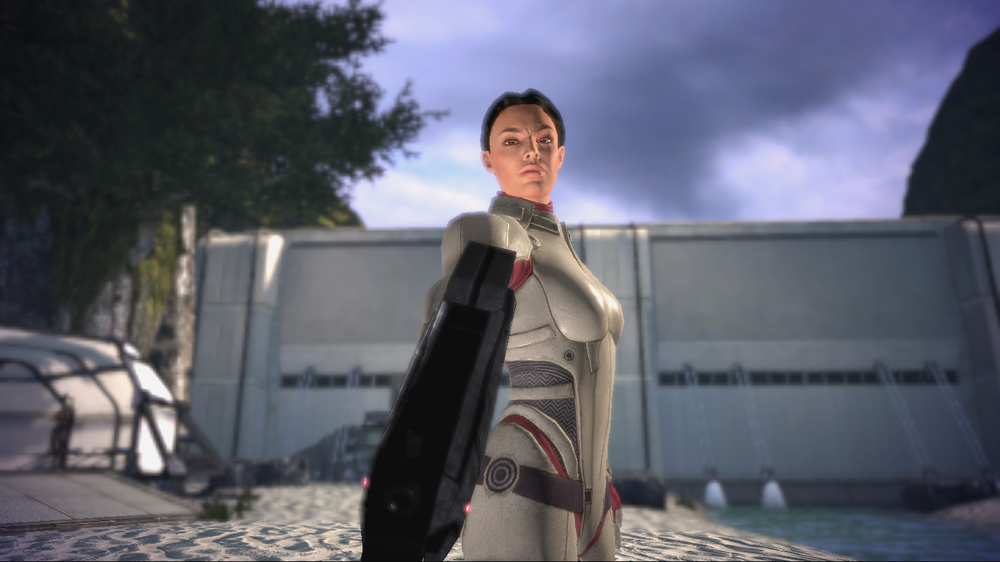
Ashley Williams
Not long later, when I had to order a crew member to his/her death during a final all-or-nothing assault on Saren's Virmire base, I chose Ashley. I did this without hesitation. I chose her because of what she'd done, and the pain she'd brought me. My heart had gone cold, and cruel, and I didn't care.
And that's when I realized I was smitten by the series. I'd made a decision based not on some elaborate meta-game analysis of risks and rewards, but one based solely on emotion. More remarkably, I felt no remorse when she died.
That was the end of that.
But it wasn't. I didn't know it, but I was still haunted by Wrex's death. I'd be haunted well into Mass Effect 3.
A FAMILY FORGED
In meta-game woulda-shoulda-coulda conversations that so many gamers have with themselves, Wrex's death represents a spectacular failure, my punishment for rushing through the game, ignoring experience-boosting side quests. Thankfully, my brain doesn't work this way. I don't enjoy fussing at myself, or trying to outsmart the game. I play games the way I want, and roll with whatever bruises they give me. Losing Wrex was a helluva shiner, but by the end of Mass Effect 1, my Shepard had put the bloody matter behind her, rose to the challenge and righteously kicked some Reaper ass.
Mass Effect 2's prologue is the best video game beginning I've ever played. Not only does the destruction of Shepard's beloved spaceship Normandy serve as an iconic, disruptive, the-rules-just-changed-you're-in-the-shit-now moment — the subsequent death and resurrection of Shepard effortlessly reboots the character, her abilities and her in-game experience, creating a perfect starting point for both veteran and new players. A clean slate for all, completely justified by story. So damned clever.
But the slate wasn't completely clean. Mass Effect 2 is about the ruin and reassembly of family. In it, Shepard is tasked with saying farewell to the Alliance — the institution that forged her (or him) into a warrior-leader — and must work with the dangerous shadow organization Cerberus. Here, Shepard must reforge relationships with allies two years gone, and make many new ones. The objective: To build a Dirty Dozen-inspired "suicide squad" tasked with taking down the Collectors, an alien race working for the Reapers.
Nearly all of the crew members Shepard recruits are outsiders — untethered humans and aliens who are either family-less, or have deep familial issues they wish to repair. To ensure the loyalty of her crew, Shepard must help these misfits. Genetically-engineered human Miranda Lawson wishes to protect her kid sister (who is in fact a clone of Miranda herself) from her tyrannical father. Masked quarian Tali'Zorah and human Jacob Taylor discover dark secrets about their fathers, servicemen who were highly regarded. Asari knight-errant Samara must confront and murder her daughter, who has become a serial killer.
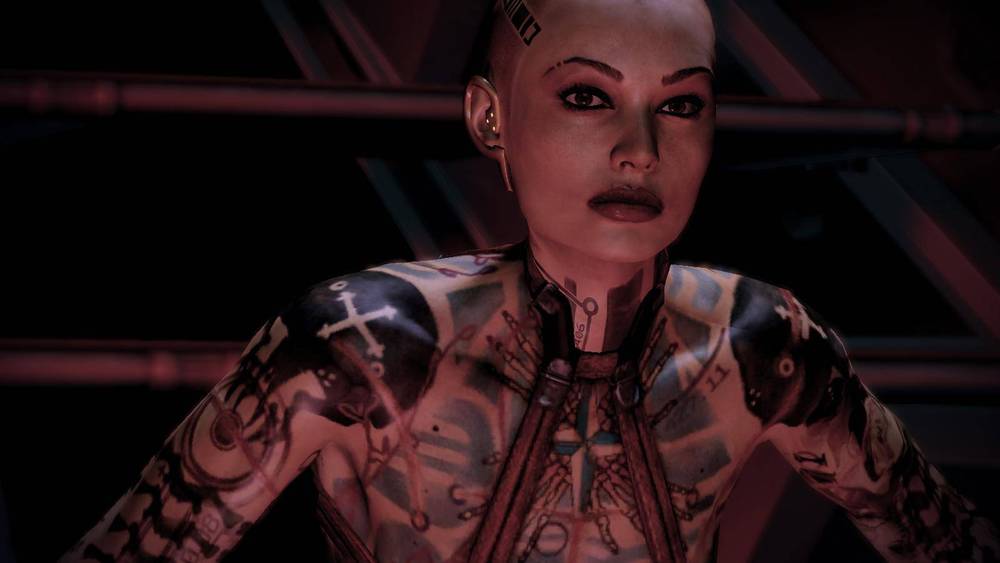
Jack
In contrast, Jack, a remorseless criminal and killer, had no family. She had been abducted as a child by Cerberus (the very organization with whom Shepard is now in league), and was confined at a research facility that tested her remarkable telekinetic powers for years. She eventually escaped, murdered anyone in her way, and lived a thug's life until she was arrested and tossed into a cryogenic prison. Shepard springs her from jail in Mass Effect 2, and helps her destroy the research facility that broke her mind and spirit all those years ago.
Jack was damaged goods, bruised to the bone. She resented authority, seemed pathologically selfish, was unreservedly surly ... and was hella great in a fight. She and Shepard got on just fine. I reckoned Jack would ditch her bad attitude after I helped her say goodbye to her painful past. But she didn't. Because saying goodbye is never that easy.
Indeed, it was the appearance of another krogan in Mass Effect 2 that reminded me of the blood on my own hands, and how I'd failed Wrex and the krogan species in the first game. The creature named Grunt was a young krogan, grown in a vat, genetically engineered to be "pure" — a super soldier, a relentless killing machine.
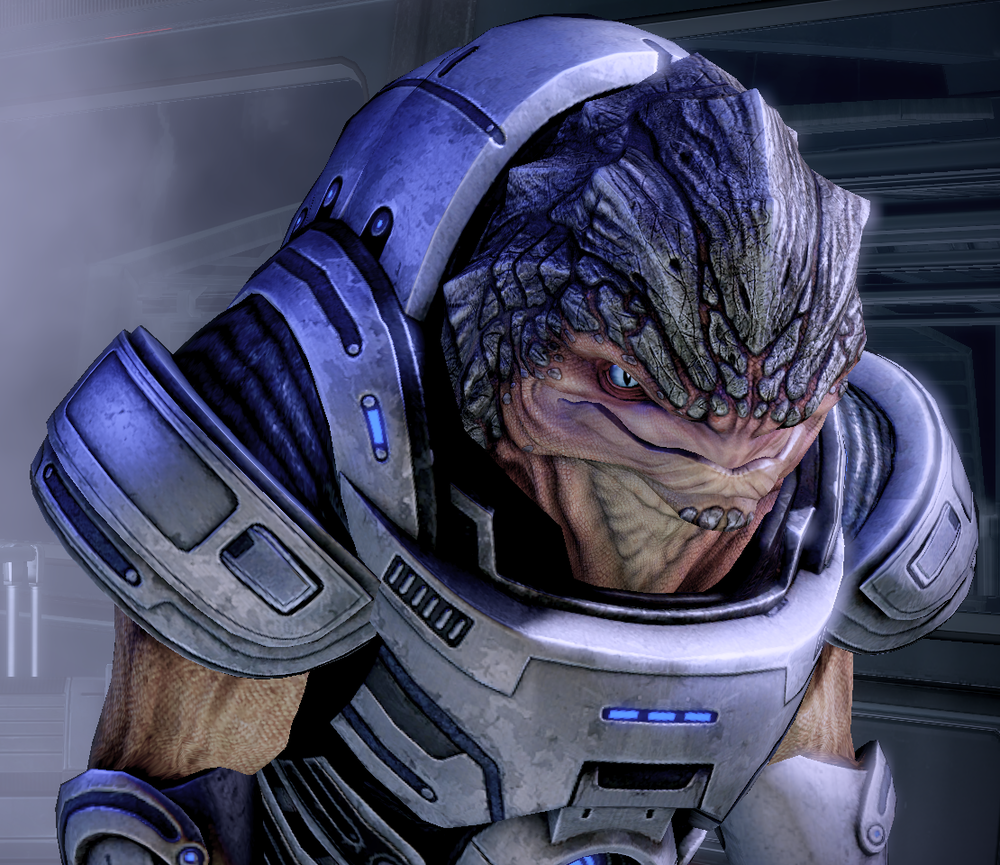
Grunt
He was sleeping in a stasis chamber when my Shepard found him. Shepard had a clear choice in how to proceed: Leave the chamber closed (and keep the sleeping apex predator inside), or open the chamber and risk the safety of, well, frickin' everybody.
This next bit is important to understand. I didn't choose to open the tank because I wanted a new squadmate, or a better game ending, or other perks meta-gamers savvily strategize about. I chose to open the tank because I wanted to make things right. I knew Grunt couldn't replace Wrex — and indeed, I didn't take a shine to him the way I did my pal from Mass Effect 1 — but I reasoned there was a karmic debt that needed to be paid. My bad decisions had contributed to the taking of a krogan life, and here I was, bringing a new one into the world.
A quick sidebar: This karmic subtext is an invention all my own, of course. Internalized, deeply personal, player-created narratives like this one are perhaps the thing I love most about the Mass Effect games (and other superb choice-driven games such as The Walking Dead). This guilt I had ... the desire to right wrongs from games past ... it was all created in my mind, a byproduct of my emotional investment in the storyworld, characters and plot. Great writing does this. Great voice performances does this. Great character animation does this.
One of my most memorable internalized narrative beats in the series occurred during the endgame of Mass Effect 2. In the midst of invading the Collector base, Shepard's crew was besieged by swarms of Seekers, insect-like things that sting and paralyze their prey. I had to choose a squaddie with biotic (telekinetic) powers who could create a forcefield bubble to protect the squad against the swarm.
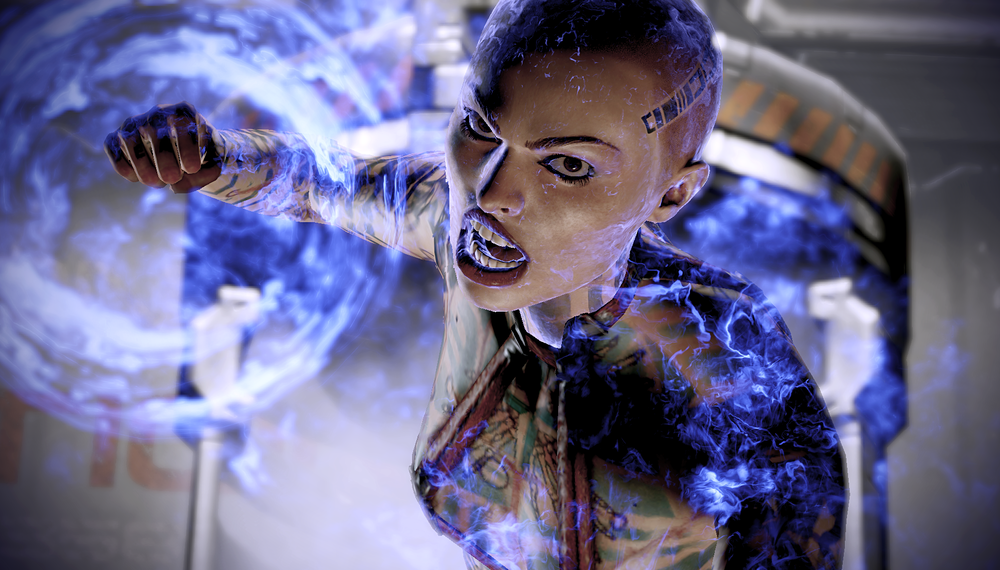
Jack, shining bright
Samara, the super-powerful asari knight-errant, was the clear choice. She was nearly 1,000 years old, and a disciplined, even-tempered telekinectic. But I wanted unpredictable Jack — she of the ruined past, she who was pathologically selfish — to have a bona-fide Hero moment, a moment where she was given the greatest responsibility of all. I had no idea if she'd come through; I just knew that after a lifetime of living in the dark, she needed a moment to shine bright. She did.
But back to the middle of Mass Effect 2 and Grunt, and the stasis tank. My Shepard opened the tank, and a great story arc began. When it came to Grunt and the krogan, it wouldn't be my last emotionally-motivated decision. In Mass Effect 2, I ordered the fast-talking salarian doctor Mordin to save some data regarding a genophage cure that had been obtained through terrible, unethical medical research. It was unlikely it could ever lead to a cure.
It didn't matter, not to me. I was trying to make things right, see.
A SECOND CHANCE
In Mass Effect 3, curing the genophage became a priority for the krogan. Considering my Shepard's arc through the series (and my personal feelings about Wrex, the genophage and the unjust punishment of the krogan 1,000 years ago), my character did everything she could to broker an alliance between the genophage's creators and the krogan.
My Shepard birddogged a cure, using the unethical research data saved from Mass Effect 2. She allied herself with the species at every turn, especially so with the female krogan Eve. As a player, I knew that the krogan, if cured, might hunger to conquer regions of the galaxy as they had generations ago. But I hoped they would instead help maintain the galactic unity Shepard was building during this stage of the war.
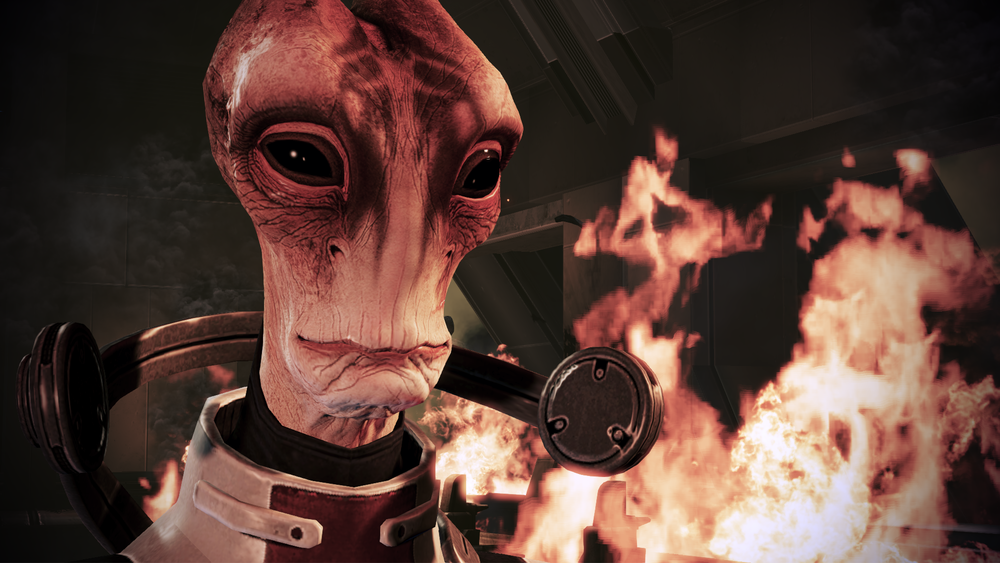
Mordin
This was a big risk, considering the subversive, revenge-minded talk hailing from Wreave, the krogan clan leader with whom I liaised. Ultimately, I had faith that trust and mercy were the best-possible options.
Trust and mercy. My character had come a long way from being the human-centric, ruthless grunt of Mass Effect 1.
There were moments when I could have sabotaged the genophage cure. I didn't. I saw it through. My Shepard lost a dear ally in the process — surely another moment of karmic balance, for victory and closure cannot come without sacrifice.
And as I watched the snowflakes of genophage cure drift down from Tuchanka's dusty sky, I finally let Wrex go. I finally put that bloody business to bed. Those terrible 90 seconds, all those dozens of hours ago.
A FINAL CHOICE
I can't say for certain if Wrex's death, and my relentless, games-long pursuit to right that particular wrong, influenced my final decision in Mass Effect 3 in a meaningful way, but it certainly informed it.
Players of the third game recall the ending's three primary choices:
- Destroy the Reapers, which would also kill all synthetic life forms throughout the galaxy, such as the geth and EDI. Even with the Reapers gone, interstellar peace would not guaranteed. Synthetics and organics might war once more. The krogan could rise up again.
- Control the Reapers, which would kill Shepard, but inject her mind into theirs, ensuring the elimination of the Reaper threat. Even with the Reapers no longer wrecking the galaxy, interstellar peace would not guaranteed. The galactic unity I'd helped create could easily unravel.
- Initiate "Synthesis," in which organic and synthetic life forms would integrate on the cellular level. This would render the Reapers' objective — to prevent organics from extinction, due to an inevitable organic/synthetic war — as obsolete. Due to this galaxy-wide "uplift" in evolution, interstellar peace would be guaranteed.
Shepard's mission, from the beginning of Mass Effect series, was to destroy the Reapers. Considering the galaxy-wide horrors (or meticulously-planned control, depending on your perspective) the Reapers committed every 50,000 years, I was on board with these orders. Kill the fuckers. Kill them all.
And yet at that moment, as my Shepard stood in the heart of the Crucible, panting and bleeding out, my mind reeled from the responsibility and the impossible stakes.
Should I sacrifice millions of innocent synthetic life forms such as the geth for a greater good — the destruction of the Reapers? Trillions of lives would be saved. But I considered the genophage and the unspeakable genocide it wrought for a thousand years, a decision the krogan did not make for themselves. Did I have the right to kill the geth, just as Ashley Williams had killed Wrex on Virmire?
Alternately, should I guarantee a lasting galaxy-wide peace by choosing Synthesis? In one swoop, my decision could end the Reaper threat, and harmonize all sentient life in a way never before seen — a genuine leap forward in evolution. But I considered the "uplifting" of the krogan 2,000 years ago. Did I have the right to make such a sweeping decision for all species ever ... a decision with no take-backs? The krogan hadn't been ready back then. Would the rest of us be now?
And then my mind turned to the genophage cure, and how I'd gone to incredible lengths to ensure its successful creation and release. I had done so because it was the right thing to do. It was just. The decision had not been without risk; the cured krogan might declare vengeance on the galaxy some day, and they'd be within their right to do so.
But I had had faith back then — faith that trust and mercy were the best-possible options. And that was where my mind settled, here, now, in the heart of the Citadel. I had faith it would work out.
My Shepard staggered to the panel that would sacrifice her life, and activate her consciousness' control over the Reapers. Trust and mercy — the two qualities my Shepard didn't have at the beginning of Mass Effect 1 — would be what she shared now. Trust in the galaxy to remain united; mercy for the Reapers.
The ending was wonderful.
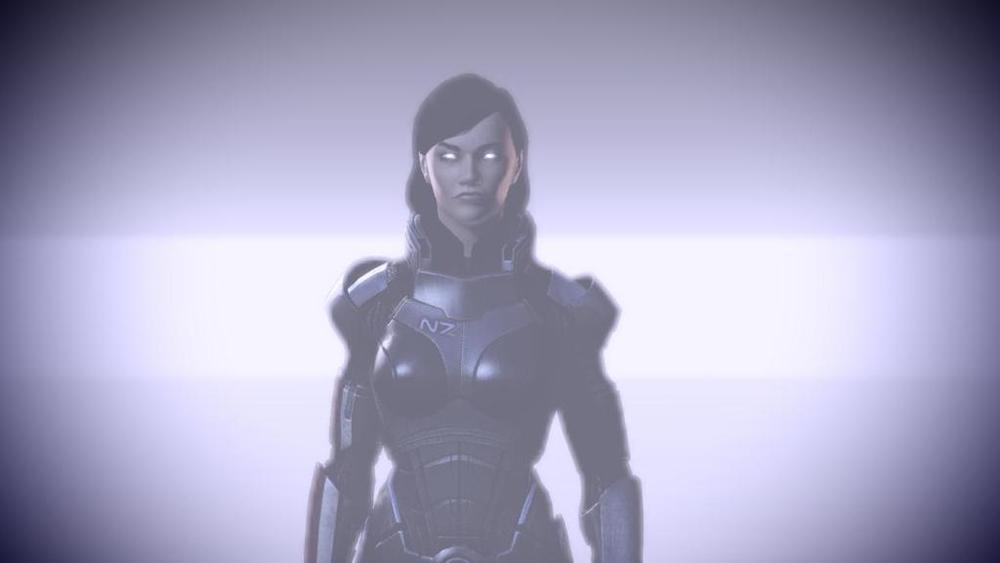
A REMARKABLE EXPERIENCE
Now that the story is over, I regard the Mass Effect games with the same reverence I have for such other brilliant science-fiction stories as The Matrix and Vernor Vinge's novel A Deepness In the Sky — I wish I could completely forget them, so I could experience them again for the first time.
For me, the trilogy represents a miraculous thing. It is an experience that one does not control, but influences; a narrative that celebrates personal choice, but wisely — and rightfully — keeps its true rudder far from players' hands. And yet, at nearly every beat during the dozens of hours I was in its storyworld, I was thoroughly convinced that every moment of Mass Effect was my own.
I intellectually understand it's all a complex illusion; a fabrication of polygons, textures and dialogue written by someone like me. It's make-believe, man. But it evoked genuine emotion, passion, and creative inspiration and aspiration.
As I said, a hearty chunk of my mind stubbornly remains back there, on those many worlds, considering the many choices I made. The rest of my mind — the part that's here with you now — will marvel at it for months to come, this genuine and awe-inspiring work of art.
Did the Mass Effect series make a similar impact on you? I'd love to hear about it. Share your own Shepard's stories in the comments.
Further episodes of Updates, Interviews and More - J.C. Hutchins
Further podcasts by J.C. Hutchins
Website of J.C. Hutchins